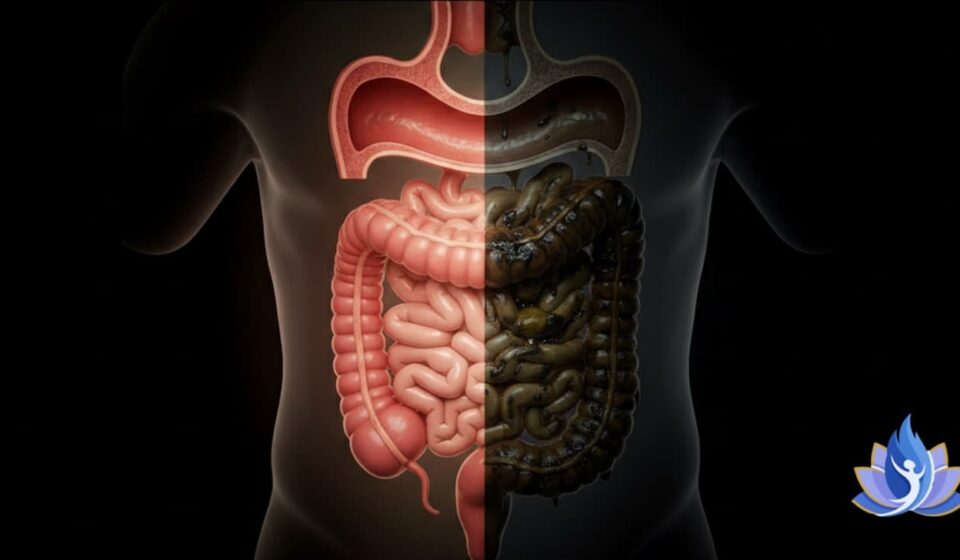In our pursuit of health, we often focus on external threats—viruses, bacteria, and environmental pollutants. But what if the greatest threat to our well-being is generated from within? Ayurveda, the ancient Indian science of life, introduces a profound concept that is central to its understanding of health and disease: Ama.
Table Of Content
Ama (आम) is a Sanskrit term that literally means “unripe,” “uncooked,” or “undigested.” It is a sticky, toxic residue that forms in the body when our digestive fire, or Agni, is weak and unable to properly metabolize the food we eat and the experiences we encounter. This toxic sludge can accumulate in our digestive tract and then spread throughout the body, clogging the channels (
srotas), disrupting tissue nutrition, and weakening our immune system. According to Ayurveda, the presence of Ama is the root cause of most diseases.
How is Ama Formed? The Agni-Ama Connection
The formation of Ama is directly linked to the state of your Agni (digestive fire). Think of your digestive system as a metabolic campfire.
- When Agni is strong: The fire burns brightly, efficiently “cooking” the food you eat and transforming it into nourishment for your tissues, leaving behind minimal waste.
- When Agni is weak: The fire is dull and sluggish. Food is not properly digested and begins to putrefy in the gut, creating a foul-smelling, toxic substance—this is Ama.
A weak Agni can be caused by many factors common in modern life: eating heavy, processed, or fried foods; irregular eating habits; emotional stress; and insufficient sleep. When Ama accumulates, it creates the perfect breeding ground for illness.
Signs and Symptoms: Do You Have Ama in Your System?
Ama manifests in various ways, both physically and mentally. Recognizing its signs is the first step toward eliminating it. Common indicators include:
- A thick, white coating on your tongue, especially in the morning.
- Persistent fatigue and a feeling of heaviness or lethargy.
- Mental fog, lack of clarity, and difficulty concentrating.
- Foul-smelling breath, sweat, or gas.
- Indigestion, bloating, and constipation.
- Aches and pains in the joints and muscles.
- A general lack of enthusiasm or a feeling of being “stuck.”
How to Eliminate Ama: A 4-Step Ayurvedic Cleanse
Clearing Ama from your system is not about extreme detoxes or fasts. It is a gentle, holistic process of rekindling your digestive fire and supporting your body’s natural cleansing mechanisms.
1. Kindle Your Agni with Diet: The most powerful way to stop producing Ama is to strengthen your Agni.
- Eat Warm, Cooked Foods: Favor meals that are warm, light, and easy to digest, like soups, steamed vegetables, and kitchari (a simple dish of rice and mung beans). Avoid cold, raw, heavy, and processed foods.
- Use Digestive Spices: Incorporate spices like ginger, cumin, coriander, fennel, and turmeric into your cooking. These spices are renowned in Ayurveda for their ability to stimulate digestion and burn Ama.
- Sip Hot Water: Drink warm water or ginger tea throughout the day. This helps to flush toxins from the system and keeps the digestive fire kindled.
2. Embrace Ayurvedic Herbs for Cleansing: Certain herbs are powerful allies in the process of detoxification.
- Triphala: This classic Ayurvedic formula, consisting of three fruits, is a gentle but effective cleanser for the entire digestive tract.
- Neem & Turmeric: Both are powerful purifiers that help cleanse the blood and support liver function.
- Trikatu: A blend of ginger, black pepper, and long pepper, Trikatu is a potent formula for stimulating Agni and burning away deep-seated Ama.
3. Adopt an Ama-Reducing Lifestyle: Your daily habits play a crucial role in managing Ama.
- Mindful Movement: Engage in regular, moderate exercise like yoga or brisk walking. This stimulates circulation and helps move stagnant toxins out of the tissues.
- Sweat It Out: Inducing a gentle sweat through exercise or a sauna helps the body eliminate toxins through the skin.
- Manage Stress: Chronic stress weakens Agni. Practices like meditation, deep breathing, and spending time in nature are essential for keeping the mind calm and digestion strong.
4. Consider a Deeper Cleanse (Panchakarma): For more significant Ama accumulation, Ayurveda recommends Panchakarma, a supervised, intensive detoxification therapy. This process uses five primary actions—such as therapeutic purgation (Virechana) and herbal enemas (Basti)—to remove deep-seated toxins from the body and reset the entire system.
“Illnesses do not come upon us out of the blue. They are developed from small daily sins against Nature. When enough sins have accumulated, illnesses will suddenly appear.” — Hippocrates
This ancient wisdom from Hippocrates perfectly mirrors the Ayurvedic concept of Ama. Disease is not a random event, but the culmination of small, daily imbalances that allow toxins to accumulate.
Conclusion: The Path to Purity and Vitality
Understanding Ama empowers you to take control of your health at its very root. It shifts the focus from treating symptoms to creating an internal environment where disease cannot thrive. By tending to your digestive fire, making conscious dietary and lifestyle choices, and supporting your body’s natural cleansing processes, you can eliminate Ama and unlock a state of vibrant health, mental clarity, and lasting well-being.
Clearing Ama is a journey back to your body’s natural state of vitality. What is one small step you can take this week to reduce Ama in your life? Share your thoughts in the comments below, pass this article on to a friend, and follow us on social media for more Ayurvedic insights.

